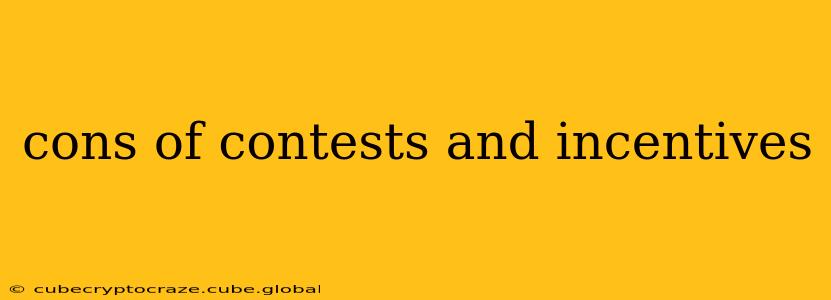Contests and incentives are powerful tools for boosting engagement, driving sales, and building brand awareness. However, like any marketing strategy, they come with potential downsides. Understanding these drawbacks is crucial for creating successful campaigns that deliver positive ROI without unintended negative consequences. This article delves into the key cons of contests and incentives, providing insights to help you weigh the pros and cons before launching your next campaign.
Are Contests and Incentives Always Worth It? The Hidden Costs
While the potential rewards are enticing, the reality is that contests and incentives aren't always a guaranteed path to success. Ignoring the potential drawbacks can lead to wasted resources and even damage your brand reputation. Let's explore the key downsides:
1. High Costs and Low ROI: Is the Juice Worth the Squeeze?
Developing and running a successful contest or incentive program requires significant investment. Consider the costs of:
- Prizes: The most obvious cost, but often underestimated. The prize needs to be attractive enough to incentivize participation, potentially leading to substantial expenditure.
- Marketing and Promotion: Reaching your target audience requires a robust marketing plan, potentially involving advertising, social media campaigns, email marketing, and more.
- Administration and Management: Managing entries, judging submissions, and distributing prizes can be time-consuming and require dedicated resources.
- Legal Compliance: Ensuring your contest or incentive program adheres to all relevant laws and regulations is essential to avoid legal issues.
If participation is low, the high costs can easily outweigh the benefits, leading to a poor return on investment (ROI). Careful planning and realistic expectations are crucial.
2. Cheating and Fraud: Protecting the Integrity of Your Contest
Contests and incentives can attract unethical participants who attempt to game the system through fraudulent entries or manipulation. This can undermine the fairness and integrity of your campaign, leading to dissatisfaction among legitimate participants. Robust monitoring and clear rules are vital to minimize this risk.
3. Negative Brand Perception: When Things Go Wrong
Poorly executed contests or incentives can damage your brand reputation. Issues like unclear rules, delays in prize distribution, or perceived unfairness can lead to negative feedback and social media backlash. This can be particularly damaging to smaller businesses with less established brand equity.
4. Unforeseen Consequences: The Butterfly Effect of Incentives
Sometimes, the outcome of a contest or incentive program deviates from initial expectations. For example, a contest intended to generate brand awareness might instead attract a large number of participants primarily focused on winning the prize, without resulting in increased brand loyalty.
5. Focus Shift from Core Business: Prioritizing the Wrong Things
Investing heavily in contests and incentives can divert resources and attention from your core business activities. This can be detrimental to long-term growth and sustainability if not properly managed.
6. Increased Customer Service Demands: Handling the Aftermath
Contests and incentives often lead to increased customer service demands, as participants may have questions about rules, eligibility, or prize delivery. Ensuring you have the resources to handle this increased workload is essential.
What are the Alternatives to Contests and Incentives?
If the cons outweigh the pros in your case, exploring alternative strategies might be more beneficial. Consider focusing on building long-term relationships with customers through:
- Loyalty Programs: Rewarding repeat customers with exclusive benefits.
- Content Marketing: Providing valuable and engaging content that establishes you as an authority in your industry.
- Referral Programs: Encouraging existing customers to refer new ones.
By carefully weighing the potential drawbacks alongside the benefits, you can make informed decisions about whether contests and incentives are the right strategy for your business. Remember that a well-planned and executed campaign can deliver excellent results, but a poorly conceived one can be detrimental.
